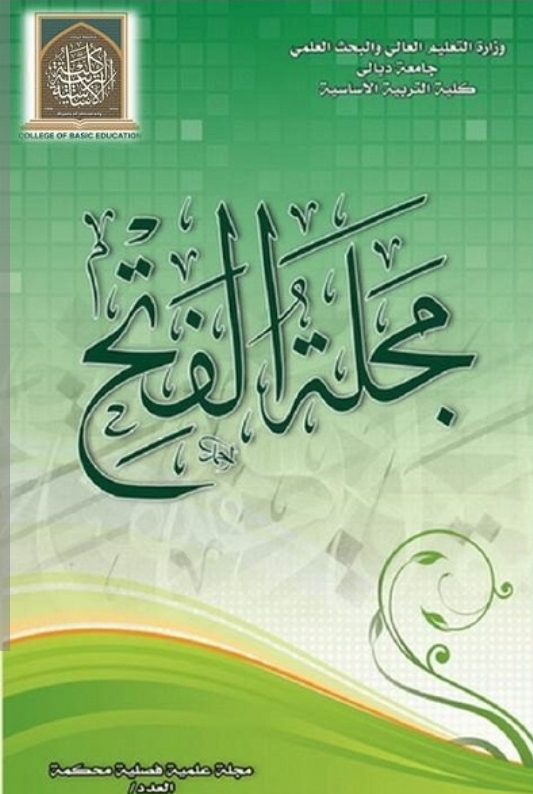Emotional wisdom among University students
Keywords:
emotional wisdomAbstract
The current research aims to identify the emotional wisdom of university students. The researchers used the descriptive research method. University students determine the research community for the academic year (2021-2022). The research sample consisted of (400) male and female students, who were chosen by a random stratified method with a proportional distribution from six colleges (the College of Education for Human Sciences, the College of Islamic Sciences, the College of Basic Education, the College of Agriculture, and the College of Sciences, and the College of Physical Education and Sports Sciences) at the University of Diyala. To achieve the research objectives, the two researchers built a measure of emotional wisdom according to the theory of Dina Saxer (Dena Saxer, 2009).
The emotional wisdom scale consists of (30) items. The tool's apparent validity, construct validity, and factor analysis were verified, the reliability was confirmed by retesting, and the reliability coefficient was (0.79). And the tool's stability coefficient was reached by the Alpha Cronbach method (0.81) and using statistical means (one-sample t-test, Pearson correlation coefficient, Z-test, Alpha-Cronbach coefficient, factor analysis, regression analysis, and analysis of variance).
References
ال دحيم, عبدالرحمن ظافر فهد ( 2016 ) التفكير القائم على الحكمة كمتنبيء بالعوامل الخمس الكبرى للشخصية لدى الموهوبين في المرحلة الثانوية. رسالة ماجستير, قسم التربية الخاصة, جامعة الملك فيصل .
الجابري، كاظم كريم وصبري، داود عبدالسلام (2013): مناهج البحث العلميّ، دار الكتب والوثائق للنشر، بغداد، العراق.
-شاهين, هيام صابر) 2012 ( اسهام كل من الذكاء الاجتماعي وأحداث الحياة الضاغطة في التنبؤ بالحكمة لدى معلمي مدارس التربية الفكرية. مجلة العلوم التربوية والنفسية. المجلد 13 , العدد 3.
علاء الدين عبد الحميد أيوب ( ٢٠١٢ ). أثر برنامج تدريبى لتنمية التفكير القائم على الحكمة فى تحسين استراتيجيات المواجهة لحل المشكلات الضاغطة لدى طلاب الجامعة،.٢٤١- المجلة المصرية للدراسات النفسية، المجلد ٢٢ ، العدد ٧٧.
Ardelt, M. (2003). Empirical assessment of a three-dimensional wisdom scale. Research on Aging, 25, 275-324.
Ardelt, M. (2005). How wise people cope with crises and obstacles in life. ReVision, 28, 7-19
Baltes ,Paul .B., &UteKunzmann .(2003) . “Wisdom ". The Psychologist 16. In O. G. Brrim & J. Kagan (Eds.),Constancy and change in human development . Cambridge, MA: Harvard University Press.
Baltes ,Paul .B.,.(2003) . “Wisdom ". The Psychologist 16. In O. G. Brrim & J. Kagan (Eds.),Constancy and change in human development . Cambridge, MA: Harvard University Press.
Dena Saxer (2009): Emotional wisdom : daily tools for transforming anger, depression, and fear, First printing, Library of Congress Cataloging-in-Publication Data .
Dena Saxer (2009): Emotional wisdom : daily tools for transforming anger, depression, and fear, First printing, Library of Congress Cataloging-in-Publication Data.
Glück, J. &Bluck, J. (2011).Lay people’s conceptions of wisdom and its development: cognitive and integrative views. Psychological Sciences,.
Staudinger, U. M. (1999). Older and wise? Integrating results on the relationship between age and wisdom – related performance, International Journal of behavioural development.
Downloads
Published
How to Cite
Issue
Section
License
Copyright (c) 2023 https://creativecommons.org/licenses/by/4.0/

This work is licensed under a Creative Commons Attribution 4.0 International License.
حقوق النشر والترخيص
تطبق مجلة الفتح للبحوث التربوية والنفسية ترخيص CC BY (ترخيص Creative Commons Attribution 4.0 International). يسمح هذا الترخيص للمؤلفين بالاحتفاظ بملكية حقوق الطبع والنشر لأوراقهم. لكن هذا الترخيص يسمح لأي مستخدم بتنزيل المقالة وطباعتها واستخراجها وإعادة استخدامها وأرشفتها وتوزيعها ، طالما تم منح الائتمان المناسب للمؤلفين ومصدر العمل. يضمن الترخيص أن المقالة ستكون متاحة على نطاق واسع بقدر الإمكان وأن المقالة يمكن تضمينها في أي أرشيف علمي.
لمزيد من المعلومات، يرجى متابعة الرابط: https://creativecommons.org/licenses/by/4.0/.


